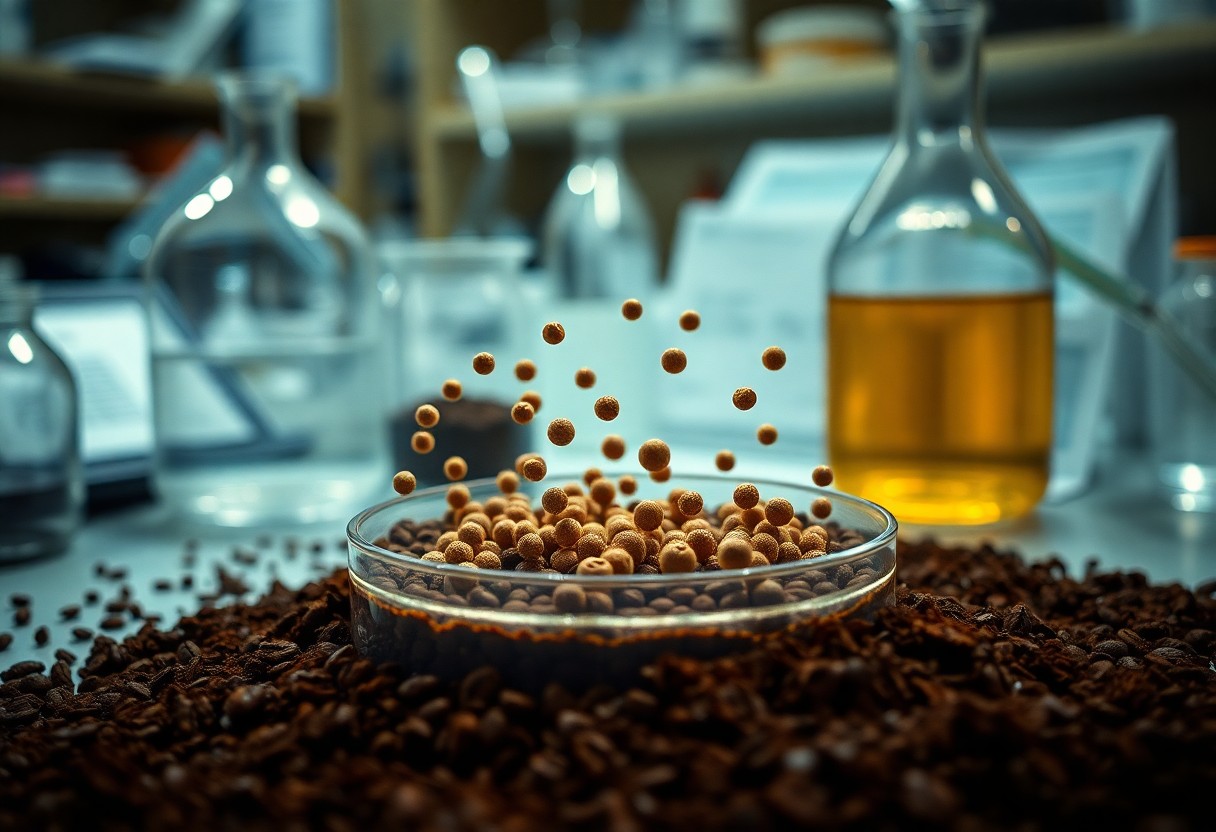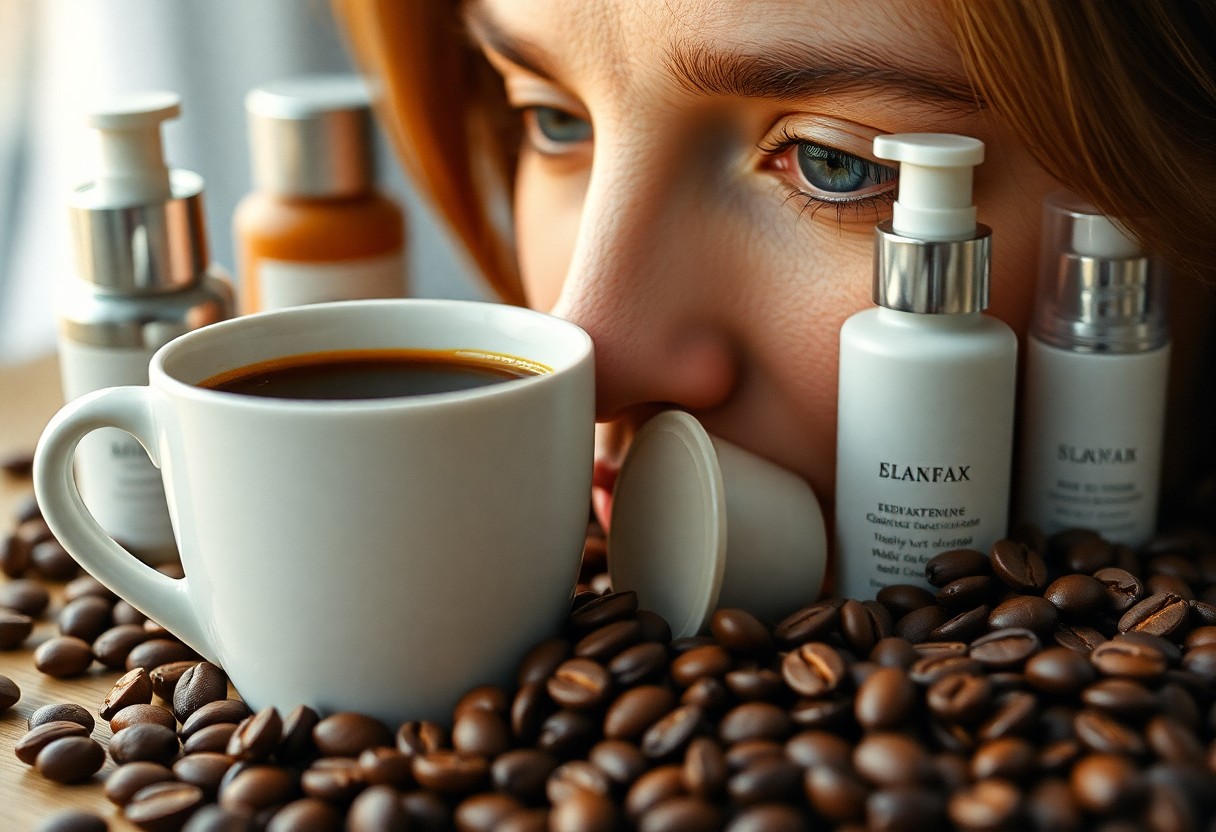Most people enjoy coffee for its rich flavor and energizing effects, but you might wonder how it impacts your skin. While some believe coffee causes acne and dehydration, others claim it offers antioxidant benefits that could enhance your complexion. In this post, we’ll probe into the scientific research behind these myths and explore what coffee really means for your skin health. Prepare to uncover the truth and make informed choices about your daily brew!
Key Takeaways:
- Caffeine in coffee acts as an antioxidant, potentially providing protective benefits to the skin when consumed in moderation.
- Excessive coffee consumption may lead to dehydration, which can negatively impact skin health and appearance.
- The relationship between coffee and skin varies among individuals; factors such as genetics, overall diet, and lifestyle play significant roles in skin condition.

The Biochemical Breakdown: How Caffeine Interacts with Your Skin
Caffeine impacts your skin through various biochemical pathways. It acts as a stimulant, promoting the dilation of blood vessels, which can enhance nutrient delivery and waste removal in your skin. Furthermore, caffeine inhibits the enzyme phosphodiesterase, which helps regulate cell metabolism, potentially leading to improved skin tone and texture. Additionally, when absorbed topically, caffeine can temporarily tighten and brighten the skin, combating puffiness and dark circles.
Caffeine’s Effects on Blood Flow and Circulation
The stimulation of blood flow and circulation caused by caffeine provides notable benefits for your skin. Increased blood flow brings crucial nutrients and oxygen to the skin’s surface while helping to remove toxins. This process can lead to a more radiant appearance and reduced instances of dullness. Furthermore, enhanced circulation can decrease the visibility of fine lines and wrinkles, contributing to a youthful look.
Antioxidant Properties: Can Caffeine Fight Aging?
Rich in antioxidants, caffeine plays a significant role in defending your skin against the damage caused by free radicals. These unstable molecules can accelerate aging by breaking down collagen and elastin, leading to wrinkles and sagging. Incorporating caffeine into your skincare routine may counteract such effects by neutralizing these harmful free radicals, thereby promoting a more youthful appearance.
Studies indicate that caffeine can reduce inflammation and promote healing, further contributing to its anti-aging properties. For instance, research published in the *Journal of Investigative Dermatology* showed that topical caffeine could enhance the skin’s barrier function, making it more resilient against environmental stressors. With regular use, caffeine can potentially brighten your skin tone and improve overall texture, making it a valuable addition to your anti-aging arsenal.
Debunking Common Myths about Coffee and Skin Health
Misinformation often clouds the relationship between coffee and skin health. Many believe that coffee consumption leads to significant skin issues, such as acne or dehydration. However, scientific studies reveal a more nuanced reality. Understanding these myths helps you make informed choices about your coffee habits and their effects on your skin.
Does Coffee Cause Acne? Separating Fact from Fiction
The idea that coffee directly causes acne is more fiction than fact. Instead, acne is typically associated with hormonal fluctuations, diet, and skincare habits. While excessive sugar and dairy found in some coffee drinks may trigger breakouts for some individuals, studies show that caffeine itself does not contribute to acne development. Instead, maintaining a balanced diet alongside your coffee consumption is vital for healthy skin.
The Hydration Debate: Can Coffee Contribute to Skin Dehydration?
While some believe that coffee consumption leads to skin dehydration, research indicates that moderate coffee intake does not have a significant dehydrating effect. In fact, the water content in your coffee can contribute positively to your overall hydration levels. However, it’s crucial to balance your coffee enjoyment with adequate water intake to support optimal skin health.
The concern over coffee dehydrating your skin stems from its caffeine content, a diuretic that can increase urine output. However, the impact of caffeine is relatively minor when consumed in moderation. A study published in the *Journal of Human Nutrition and Dietetics* found that people who drink caffeinated beverages can maintain hydration levels comparable to those who consume only water. Additionally, the moisture provided by the liquid aspect of coffee contributes positively, so as long as you’re mindful of your overall hydration, your coffee habit likely won’t spell doom for your skin’s moisture level.
Coffee in Skincare: The Rise of Caffeinated Products
The beauty industry is witnessing a surge in caffeinated products, with coffee becoming an increasingly popular ingredient. This trend stems from its reputed benefits, such as antioxidant properties and anti-inflammatory effects, which are believed to rejuvenate the skin. Products ranging from scrubs to serums are capitalizing on coffee’s potential, promising revitalized and nourished skin. The growing demand reflects a broader interest in natural ingredients, allowing you to indulge in the dual pleasure of skincare and your favorite morning brew.
Popular Coffee-Infused Skincare Ingredients
Coffee is often paired with other beneficial ingredients to enhance its skin-loving properties. You’ll find coffee extracts, coffee oil, and ground coffee beans included in a variety of products. These ingredients are celebrated for their ability to provide gentle exfoliation, improve circulation, and deliver vital antioxidants. Notably, the combination of coffee with ingredients like coconut oil or honey enhances hydration, making the formulations even more appealing for those seeking a radiant complexion.
Efficacy of Caffeinated Topicals: What the Research Says
The effectiveness of caffeinated skincare products has been a subject of interest among researchers. Studies indicate that caffeine applied topically can help reduce the appearance of puffiness and dark circles, likely due to its ability to constrict blood vessels and reduce inflammation. It’s also associated with increased skin firmness and improved elasticity. Although more extensive clinical trials are needed, existing evidence points toward the positive impact of caffeine on your skin.
Research has shown that products containing caffeine can significantly benefit your skin. For example, a study published in the “Journal of Investigative Dermatology” indicated that caffeine can inhibit the production of inflammation-promoting compounds in cells, thereby reducing redness and irritation. Additionally, caffeine has demonstrated photoprotective properties, providing some level of defense against UV damage when applied topically. Overall, while anecdotal experiences abound, scientific studies suggest that caffeinated topicals can indeed work wonders, with continued interest likely leading to further advancements in this area of skincare.

Dermatologists Weigh In: Professional Perspectives on Coffee’s Skin Impact
Industry experts provide a comprehensive look at how coffee influences skin health. Many dermatologists suggest that moderate coffee consumption can have both positive and negative effects on the skin. While the antioxidants in coffee may help improve skin vitality and reduce signs of aging, excessive intake could lead to dehydration, which may exacerbate certain skin conditions. It’s necessary to consider individual skin types and conditions when evaluating coffee’s overall impact.
Expert Opinions on Daily Coffee Consumption and Skin Conditions
Daily coffee consumption can influence various skin conditions, according to healthcare professionals. For instance, caffeine’s anti-inflammatory properties might benefit those with conditions like rosacea or psoriasis by soothing flare-ups. However, for individuals prone to acne, high caffeine intake and sugar-laden coffee beverages may potentially aggravate breakouts due to insulin spikes. Each individual should assess their unique relationship with coffee and monitor their skin’s response.
Skin Care Routines: Should Coffee Be Included?
Integrating coffee into your skincare routine can offer significant benefits, particularly from products that harness its antioxidant properties. Whether in scrubs, masks, or oils, coffee can enhance blood circulation, giving your skin a more radiant appearance and potentially reducing puffiness, especially around the eyes. However, using coffee topically might not replace the need for a balanced skincare regimen; instead, it complements it by providing an additional layer of care.
Consider using coffee-infused skincare products, like exfoliating scrubs or eye creams, that leverage its natural benefits. These products can help improve your skin texture and appear more energized due to the stimulating properties of caffeine. If you struggle with puffiness or dark circles, look for eye creams containing coffee as a key ingredient. Always follow with appropriate sun protection and hydration, as coffee alone won’t address all of your skin concerns. A personalized approach that combines the benefits of coffee with other skincare elements can lead to optimal results.
Practical Tips for Coffee Lovers to Maintain Healthy Skin
To enjoy your coffee habit while nurturing your skin, consider these straightforward practices:
- Limit your coffee intake to 1-2 cups a day to reduce caffeine’s adverse effects.
- Stay hydrated by drinking plenty of water throughout the day.
- Incorporate a diet rich in antioxidants, including fruits and vegetables, to combat oxidative stress.
- Apply a broad-spectrum sunscreen daily to protect against UV damage.
- Consider taking breaks from coffee every now and then to evaluate its effects on your skin.
Recognizing the balance between enjoyment and skin health is key.
Balancing Coffee Intake with Hydration and Nutrition
Your daily cup of coffee shouldn’t come at the expense of proper hydration and nutrition. For every cup of coffee you drink, aim to consume equal, if not more, amounts of water. This helps to counterbalance coffee’s dehydrating effects and keeps your skin looking plump and radiant. Incorporating foods rich in vitamins, minerals, and antioxidants, like berries, nuts, and leafy greens, can further enhance your skin’s appearance and resilience against harmful factors.
DIY Coffee Scrubs and Masks: Do They Actually Work?
Creating your own coffee scrubs and masks can be a fun and potentially beneficial way to use your leftover coffee grounds. These scrubs may help to exfoliate the skin, boost circulation, and even provide antioxidant benefits. While some enthusiasts swear by their effects, the overall scientific evidence remains mixed regarding their efficacy. Still, the natural properties of coffee could offer a mild tightening and brightening effect on your skin.
For a DIY coffee scrub, mix equal parts of used coffee grounds and coconut oil to create a paste. Apply to damp skin in gentle circular motions, allowing it to sit for a few minutes before rinsing. The gentle abrasiveness of the grounds helps slough off dead skin cells, while caffeine might promote circulation and temporarily reduce puffiness. Ultimately, while these treatments can enhance your skincare routine, they are not a replacement for consistent dermatological care.
Final Words
The science surrounding coffee’s impact on your skin reveals a complex relationship driven by factors like hydration, antioxidants, and individual skin types. While moderate coffee consumption can offer some protective benefits due to its antioxidant content, excessive intake may lead to dehydration, potentially affecting your skin’s appearance. Ultimately, understanding how coffee interacts with your body enables you to make informed decisions about your consumption and its effect on your skin health, helping you achieve a vibrant, healthy complexion.
FAQ
Q: Does coffee consumption lead to acne?
A: Research suggests that coffee itself is not a direct cause of acne. However, excessive caffeine consumption can lead to increased stress levels and hormonal fluctuations, which may contribute to breakouts. Additionally, a diet high in sugar and dairy, typically associated with coffee additives, could have an indirect effect on skin health. Maintaining a balanced diet while monitoring individual reactions is advisable.
Q: Can coffee provide benefits for the skin?
A: Yes, coffee contains antioxidants that can be beneficial for the skin. These antioxidants help combat free radicals, which can damage skin cells and lead to aging. Furthermore, coffee grounds are often used in scrubs due to their exfoliating properties, promoting circulation and revealing healthier skin. Topical application of coffee-based products may enhance skin texture when used appropriately.
Q: How does hydration from coffee affect skin health?
A: Coffee is a diuretic, which means it can lead to increased urination and potential dehydration if consumed in excess. Dehydration can result in dry, dull skin. However, moderate coffee intake is typically not enough to cause significant dehydration. It’s vital to balance coffee consumption with adequate water intake to maintain optimal skin hydration.
Q: Is there a link between coffee and skin aging?
A: While coffee contains antioxidants that can help combat skin aging, excessive caffeine may lead to increased stress levels, which can accelerate the aging process. Consuming coffee in moderation, combined with a healthy lifestyle, can help mitigate these effects. Additionally, maintaining a good skincare routine and staying hydrated is vital for preserving youthful skin.
Q: Can coffee cause skin irritation or sensitivities?
A: For some individuals, topical application of coffee grounds or coffee-based products may lead to skin irritation, especially if they have sensitive skin. It’s advisable to conduct a patch test before using new products and to be mindful of personal skin reactions. If irritation occurs, discontinue use and consult a dermatologist for suitable alternatives.
